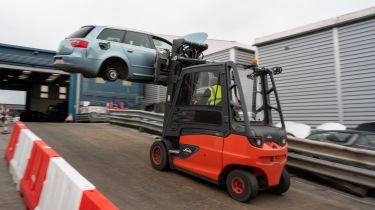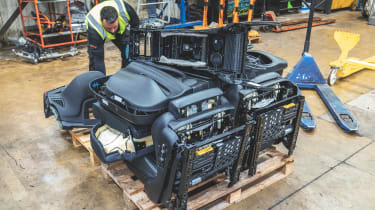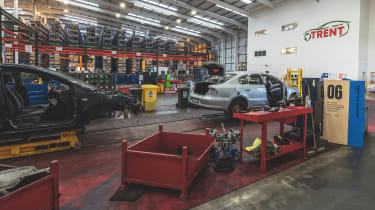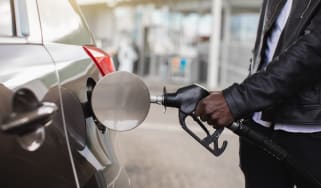Recycled car parts: sourcing, quality and how much you could save
We visit the vehicle recycling centre that’s changing the face of scrap dealers and promoting component recycling in the process
Would you consider letting a garage or bodyshop fit second-hand or recycled car parts from a scrap dealer to your pride and joy? If the answer’s no, then you’d better check the small print on your insurance. Any number of policies these days have a clause in the T&Cs saying that repairs can include salvaged parts at the whim of your insurer.
They call the parts ‘recycled’ or ‘green’ rather than second-hand, which puts a more positive spin on the proposition, and insurers don’t allow any safety-critical used parts to be fitted when dealing with a claim, regardless of their reported condition. Used body and trim parts are fair game, though, as long as they are in a suitable condition, and as long as the car they came from is no older than the car being repaired. In the eyes of the insurance industry, this means customers will not be left in a worse position than they were before an accident.
In spite of the terminology, the trend towards recycled parts is not driven primarily by the desire to save the planet, although companies will happily bandy around stats to show how the use of salvaged parts will help to save us all from global warming.
The reality is that post-pandemic supply chain issues mean insurers are struggling to find the new components needed for repairs, and are increasingly turning to the vehicle-dismantling industry to help fill inventory gaps and get jobs completed. The fact that they can save a few quid undoubtedly helps too, but there’s no sign of savings being passed to consumers via lower premiums. From the dismantlers’ point of view, improved standards mean more sales at higher prices and increased profit.
But it’s not just insurers who need cost-effective parts. Many drivers, particularly of older cars, can’t afford the high cost of new components. Even if they could, fitting expensive new items may not make much financial sense in an older car and, while many garages won’t source used parts to avoid liability if they’re faulty, they’ll happily fit used parts that customers have bought at their own risk.
A few decades ago, for many DIY-inclined drivers, that meant rocking up to a local scrapyard and removing parts yourself from a wreck rotting in a muddy wasteland of twisted metal. Those scrappies have become a thing of the past, and while today’s dismantlers haven’t quite become glitzy palaces like franchised car dealers, a raft of environmental, health and safety, and duty-of-care commitments mean the days of dads turning up with the spanners while their kids play among the towering scrap piles are long gone. But the memories linger, and some people still need reassuring that parts salvaged and sold on by the new breed of vehicle dismantlers are a trustworthy proposition.
Making the case for recycled parts
There’s no legal definition of a recycled part that makes it any different from a second-hand or salvaged component, but the Vehicle Recyclers Association (formerly the Motor Vehicle Dismantlers Association) has an audited accreditation scheme, which commits members to a code of practice.
The primary shop window for recycled parts is eBay, which is supporting the VRA’s efforts to promote the trade. It estimates that UK drivers saved almost £100million buying recycled parts instead of new ones via its website last year, and it recently launched a new portal for ‘Certified Recycled’ spare parts. However, eBay’s research shows that nearly 30 per cent of drivers prefer to buy new parts – a statistic the Certified Recycle scheme aims to address.
So what are you getting with a Certified Recycled part from eBay? Reassurance, hopefully, thanks to rigorous standards that accredited recyclers must adhere to. These start with traceability of origin to ensure parts are not stolen, and parts must be inspected and graded for quality and safety, tested for full functionality, cleaned and refurbished as necessary to ensure they are safe and reliable. After that, all body parts are covered by a 12-month warranty, while mechanical parts get at least three months of cover.
If you choose to buy a second-hand part that isn’t certified from a business, in theory you have the same consumer rights as you would when buying new. Asserting those rights if things go wrong may not be easy, though, which is why schemes such as eBay’s Certified Recycled also have the backing of the Chartered Trading Standards Institute.
Guaranteed quality
As well as the warranties, Certified Recycled parts also have eBay’s money-back guarantee, and as you’d expect, vendors take pains to ensure that customers don’t need to send parts back. All items are tested before being dismantled and graded, with hydrocarbon and compression tests on engines, a visual evaluation of fluids and oils, and inspections for external cracks or defects. Body parts get a rating based on their condition, while mechanical parts are graded based on vehicle mileage. For engines and mechanical parts that work as intended, the ratings are based on mileage. Grade A is sub-60,000, Grade B sub-100,000 and Grade C over 100k. Grade D is for parts that are not tested, or that aren’t functioning correctly.
Grade A for electrical parts that can’t be seen means they work as originally intended, but the ratings for body panels are a bit more complex. They are based on the need for bodyshops and insurers to be able to estimate the amount of work required when using recycled parts. Grade A panels must be ready for preparation and painting, which means no damage to existing paint bigger than a 1mm scratch, scuff or dent, while Grade 2 panels may have two similarly sized areas of damage including on contour or swage lines. Grade C panels require significant repair and paint, while Grade D panels require specialist repair such as welding. Insurance companies typically only accept Grade 1 panels, which need only to be painted to match the car they’ll fit.
Recycling in action
We find ourselves in Poole, Dorset, at the premises of Charles Trent Ltd, a business salvaging and selling around 3,000 recycled parts per week. Thanks to major investments in production line-style dismantling, up to 95 per cent of every vehicle is recycled, to be placed in Amazon-style warehousing and rapid distribution.
Current CEO Marc Trent shows us around the impressive facilities constructed last year on a site his family has operated – in more traditional fashion – for the best part of 100 years. He took the reins in 1999 and has overseen a transition from traditional salvage yard to probably the most potent force in the UK vehicle recycling industry.
“I’m the fourth generation, and have been in it all my life since I was 18 months old, although I didn’t get paid until I was 16!” he tells us with a grin. Nowadays he employs 240 staff and describes the operation as “a family business with 240 employees and corporate values”.
The first stop of our tour is a large open yard, where once-loved cars meet their maker. Around 100 arrive on transporters every day, and they’re a mix of what Marc calls ‘natural end of life’ and ‘premature end of life’ vehicles. In the old days, they’d have been called clapped-out or crashed. Marc tells us most of the former come most from private individuals when they’re no longer economical to keep on the road, while many of the latter are bought from auctions, having been written off after accidents or theft.
“We get a good feel for what a car is worth, thanks to lots of experience and gut instinct. Plus a lot of data is generated by Internet sales, allowing us to track demand,” Marc tells us.
The first stage of the recycling process starts immediately, with parts wanted from each car identified and evaluated, while the vehicle is cleaned and photographed and any personal effects removed. The next stage is known as ‘depollution’, and involves the separation of wheels and tyres before the car is put on a rig designed to suck out all its fuel, oils, air-conditioning gases and other fluids – Marc calls it “a giant milking machine for cars”.
Once emptied of environmental and safety hazards – including large quantities of petrol and diesel, which are sold on to staff at 45p per litre – the cars are moved to the main hall, where two dismantling lines run side by side. Door panels and bonnets are removed, then major electrical items including the lights and centre console, and then mechanical items such as the engine and drivetrain, rear axle and catalytic converter. After that it’s the turn of the dashboard, most of the wiring harness, infotainment and heater systems, leaving a near-bare shell that’s sent to the crusher.
“The average car will have 20kg of copper wiring, and we can reclaim about 10kg. Electric cars have up to 120kg of wire – the copper is currently worth £3,000 per tonne,” says Marc, before pointing to a modest basket of catalytic converters. “That’s about £4,500 sitting in there,” he says.
Meanwhile, the powertrain and other assemblies are reduced to their component parts, cleaned and graded to Certified Recycled standards before being weighed and packed for distribution. The site features a bespoke racking system alongside the ‘deproduction’ lines designed to prevent damage while holding up to 7,000 panels. All told, the facility can hold 71,000 parts, including 1,500 complete engines and 1,500 gearboxes.
It’s an impressive set up, especially considering both lines will soon be running at “one car on, one off” every 15 minutes. The business is planning to open five similar plants across the UK within five years, based on a model (part-owned by Renault) tried and tested in France, where legislation already ensures a minimum number of recycled parts are used by vehicle repairers.
Despite the slick nature of his operation, Marc acknowledges there is some way to go to shift opinion in the UK vehicle repair business. “70 per cent of our sales come from private individuals, but often they’re ordering on the advice of garages,” he says. “Now we’re saying to garages that if it doesn’t fit or doesn’t work, we’ll pay your labour to replace it, so we’re underwriting ourselves. But in reality, because of our processes, that doesn’t happen.”
How much cash can recycled parts save you?
The industry reckons that recycled parts typically save buyers 70 per cent of the new cost, but that’s not always the case for in-demand items. Here are a selection of typical prices provided by eBay from its Certified Recycled portal.
|
Model |
Part |
RRP |
eBay Certified Recycled cost |
Saving | |
|
£ |
% | ||||
|
2018 Vauxhall Corsa |
Tailgate |
£562.60 |
£138 |
£424.60 |
75% |
|
2019 Nissan Qashqai |
Bonnet |
£376.90 |
£120 |
£256.90 |
68% |
|
2018 MINI hatchback |
Headlamp |
£598.19 |
£275 |
£323.19 |
54% |
|
2021 Tesla Model 3 |
Rear door |
£558.33 |
£360 |
£198.33 |
35% |
|
2020 Volkswagen Golf |
Door mirror |
£305.76 |
£200 |
£105.76 |
34% |
Tell us what you love (and hate) about your car. Take the Driver Power survey now and you could win a £100 Amazon voucher...
Find a car with the experts














